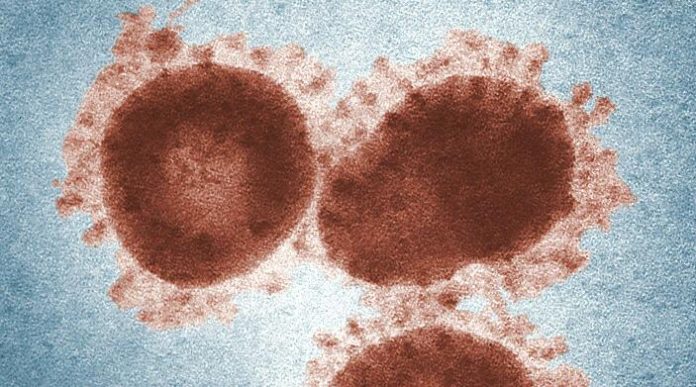The plant derived agent, Thapsigargin (TG) has been used in traditional medicine for long time. TG has shown promises as a potential anti-cancer drug because of its biological property to inhibit the sarcoplasmic/endoplasmic reticulum Ca2+ ATPase (SERCA) pump which is necessary for cell to be viable. Its prodrug has completed phase 1 of clinical trial. According to a latest research report, TG has shown broad-spectrum antiviral property against a range of human viruses in preclinical trials. The results suggest TG may be used as inhibitor against SARS-CoV-2, the novel coronavirus responsible for COVID-19.
Thapsigargin (TG), a plant derived agent from the common weed Thapsia garganica (Apiaceae) which is native to the Mediterranean. The plant is highly toxic to cattle and sheep and hence is called ‘’deadly carrot’’. The resins derived from this plant has been used in traditional medicine for various ailments for centuries.
The cytotoxic property of thapsigargin is due to its ability to inhibit sarcoplasmic/endoplasmic reticulum Ca2+ ATPase (SERCA) pump thereby making the cells non-viable. This made TG a potential anticancer candidate (1). Its prodrug Mipsagargin has completed phase 1 of clinical trial but no results have been posted yet (2).
At non-cytotoxic levels, thapsigargin is found to have antiviral property against Influenza A virus in animal models (3). Further research has shown TG to be highly effective against respiratory syncytial virus (RSV), common cold coronavirus OC43, SARS-CoV-2 and influenza A virus in primary human cells, thus making thapsigargin a potential broad-spectrum anti-viral agent for the treatment of viral diseases in humans (4). This development offers a new strategic tool to deal with COVID-19 caused by SARS-CoV-2 virus and is very significant in view of the tough situation presented by the pandemic (4,5). However, it needs to undergo mandatory clinical trials to meet the required safety and efficacy standards, before being considered for its use in treating COVID-19 infected patients.
Earlier, BX795 had shown potential as a broad-spectrum antiviral agent for use in humans (6). BX795 acts by inhibiting protein kinase B (AKT) phosphorylation and the subsequent hyperphosphorylation of 4EBP1. It has shown antiviral property against herpes simplex virus (HSV) and has also been shown to suppress inflammatory responses (7). However, no clinical trial seems to be underway for this agent to take it forward. More recently, yet another agent. diABZI (a STING agonist) has shown antiviral property against coronavirus infection (8).
These molecules show a promising hope as broad anti-viral agents in the treatment of COVID-19. However, each of these need to undergo the required clinical trials to prove their safety and efficacy before being approved for use in humans as medicine.
***
References:
- Jaskulska A., Janecka AE., and Gach-Janczak K., 2020. Thapsigargin—From Traditional Medicine to Anticancer Drug. Int. J. Mol. Sci. 2021, 22(1), 4; Published: 22 December 2020. DOI: https://doi.org/10.3390/ijms22010004
- ClinicalTrials.gov 2015. Dose-Escalation Phase 1 Study of G-202 (Mipsagargin) in Patients With Advanced Solid Tumors. ClinicalTrials.gov Identifier: NCT01056029. Available on https://clinicaltrials.gov/ct2/show/NCT01056029 Accessed on 03 February 2021.
- Goulding LV., Yang J., et al 2020. Thapsigargin at Non-Cytotoxic Levels Induces a Potent Host Antiviral Response that Blocks Influenza A Virus Replication. Viruses 2020, 12(10), 1093; Published: 27 September 2020. DOI: https://doi.org/10.3390/v12101093
- Al-Beltagi S., Preda CA., 2021. Thapsigargin Is a Broad-Spectrum Inhibitor of Major Human Respiratory Viruses: Coronavirus, Respiratory Syncytial Virus and Influenza A Virus. Viruses 2021, 13(2), 234. Published: 3 February 2021. DOI: https://doi.org/10.3390/v13020234
- University of Nottingham 2021. News – Scientists uncover potential antiviral treatment for Covid-19. Posted 03 February 2021. Available online at https://www.nottingham.ac.uk/news/thapsigargin-covid-19
- Jaishankar et al. 2018. An off-target effect of BX795 blocks herpes simplex virus type 1 infection of the eye. Science Translational Medicine. 10(428). https://doi.org/10.1126/scitranslmed.aan5861
- Yu t., Wang ZW., et al 2020. The kinase inhibitor BX795 suppresses the inflammatory response via multiple kinases. Biochemical Pharmacology Volume 174, April 2020, 113797. Published 10 January 2020. DOI: https://doi.org/10.1016/j.bcp.2020.113797
- Zhu Q., Zhang Y., 2021. Inhibition of coronavirus infection by a synthetic STING agonist in primary human airway system. Antiviral Research Volume 187, March 2021, 105015. Published 12 January 2021. DOI: https://doi.org/10.1016/j.antiviral.2021.105015
***






































